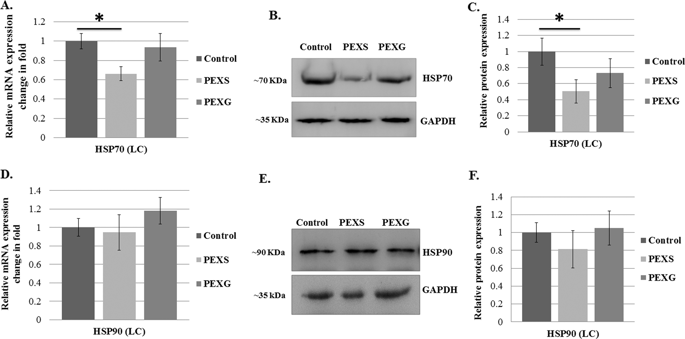当前位置:
X-MOL 学术
›
J. Hum. Genet.
›
论文详情
Our official English website, www.x-mol.net, welcomes your
feedback! (Note: you will need to create a separate account there.)
Epigenetic silencing of heat shock protein 70 through DNA hypermethylation in pseudoexfoliation syndrome and glaucoma.
Journal of Human Genetics ( IF 2.6 ) Pub Date : 2020-03-03 , DOI: 10.1038/s10038-020-0736-8 Bushra Hayat 1 , Ramani Shyam Kapuganti 1 , Biswajit Padhy 1 , Pranjya Paramita Mohanty 2 , Debasmita Pankaj Alone 1
Journal of Human Genetics ( IF 2.6 ) Pub Date : 2020-03-03 , DOI: 10.1038/s10038-020-0736-8 Bushra Hayat 1 , Ramani Shyam Kapuganti 1 , Biswajit Padhy 1 , Pranjya Paramita Mohanty 2 , Debasmita Pankaj Alone 1
Affiliation

|
This study is intended to investigate the epigenetic regulation of the most conserved molecular chaperone, HSP70 and its potential role in the pathophysiology of pseudoexfoliation syndrome (PEXS) and glaucoma (PEXG), a protein aggregopathy, contributing significantly to world blindness. Expression levels of HSP70 were significantly decreased in the lens capsule (LC) of PEXS but not in PEXG compared with that in control. Bisulfite sequencing of the LC of the study subjects revealed that the CpG islands (CGIs) located in the exonic region but not in the promoter region of HSP70 displayed hypermethylation only in PEXS individuals. There was a corresponding increase in DNA methyltransferase 3A (DNMT3A) expression in only PEXS individuals suggesting de novo methylation in this stage of the disease condition. On the other hand, peripheral blood of both PEXS and PEXG cases showed hypermethylation in the exonic region when compared with non-PEX controls displaying tissue-specific effects. Further, functional analyses of CGI spanning the exon revealed a decreased gene expression in the presence of methylated in comparison with unmethylated reporter gene vectors. Treatment of human lens epithelial B-3 (HLE B-3) cells with DNMT inhibitor restored the expression of HSP70 following depletion in methylation level at exonic CpG sites. In conclusion, a decreased HSP70 expression correlates with hypermethylation of a CGI of HSP70 in PEXS individuals. The present findings enhance our current understanding of the mechanism underlying HSP70 repression, contributing to the pathogenesis of PEX.
中文翻译:

在假性剥脱综合征和青光眼中,热激蛋白70通过DNA甲基化的表观遗传沉默。
这项研究旨在研究最保守的分子伴侣HSP70的表观遗传学调控及其在假性剥脱综合征(PEXS)和青光眼(PEXG)(一种蛋白聚集性疾病)的病理生理中的潜在作用,这对世界盲症做出了重要贡献。与对照组相比,PEXS的晶状体囊(LC)中HSP70的表达水平显着降低,但在PEXG中没有降低。研究对象LC的亚硫酸氢盐测序显示,位于HSP70外显子区域而不位于启动子区域的CpG岛(CGI)仅在PEXS个体中显示出高甲基化。仅在PEXS个体中DNA甲基转移酶3A(DNMT3A)表达相应增加,表明在该疾病状况的这一阶段从头甲基化。另一方面,与具有组织特异性作用的非PEX对照相比,PEXS和PEXG病例的外周血在外显子区域均显示甲基化过高。此外,与未甲基化的报告基因基因载体相比,跨越外显子的CGI的功能分析显示,在存在甲基化的情况下,基因表达降低。用DNMT抑制剂处理人晶状体上皮B-3(HLE B-3)细胞后,外显子CpG位点甲基化水平降低,恢复了HSP70的表达。总之,在PEXS个体中,HSP70表达的降低与HSP70的CGI的高甲基化有关。目前的发现增强了我们目前对HSP70抑制机制的认识,有助于PEX的发病机理。
更新日期:2020-04-24
中文翻译:

在假性剥脱综合征和青光眼中,热激蛋白70通过DNA甲基化的表观遗传沉默。
这项研究旨在研究最保守的分子伴侣HSP70的表观遗传学调控及其在假性剥脱综合征(PEXS)和青光眼(PEXG)(一种蛋白聚集性疾病)的病理生理中的潜在作用,这对世界盲症做出了重要贡献。与对照组相比,PEXS的晶状体囊(LC)中HSP70的表达水平显着降低,但在PEXG中没有降低。研究对象LC的亚硫酸氢盐测序显示,位于HSP70外显子区域而不位于启动子区域的CpG岛(CGI)仅在PEXS个体中显示出高甲基化。仅在PEXS个体中DNA甲基转移酶3A(DNMT3A)表达相应增加,表明在该疾病状况的这一阶段从头甲基化。另一方面,与具有组织特异性作用的非PEX对照相比,PEXS和PEXG病例的外周血在外显子区域均显示甲基化过高。此外,与未甲基化的报告基因基因载体相比,跨越外显子的CGI的功能分析显示,在存在甲基化的情况下,基因表达降低。用DNMT抑制剂处理人晶状体上皮B-3(HLE B-3)细胞后,外显子CpG位点甲基化水平降低,恢复了HSP70的表达。总之,在PEXS个体中,HSP70表达的降低与HSP70的CGI的高甲基化有关。目前的发现增强了我们目前对HSP70抑制机制的认识,有助于PEX的发病机理。











































 京公网安备 11010802027423号
京公网安备 11010802027423号